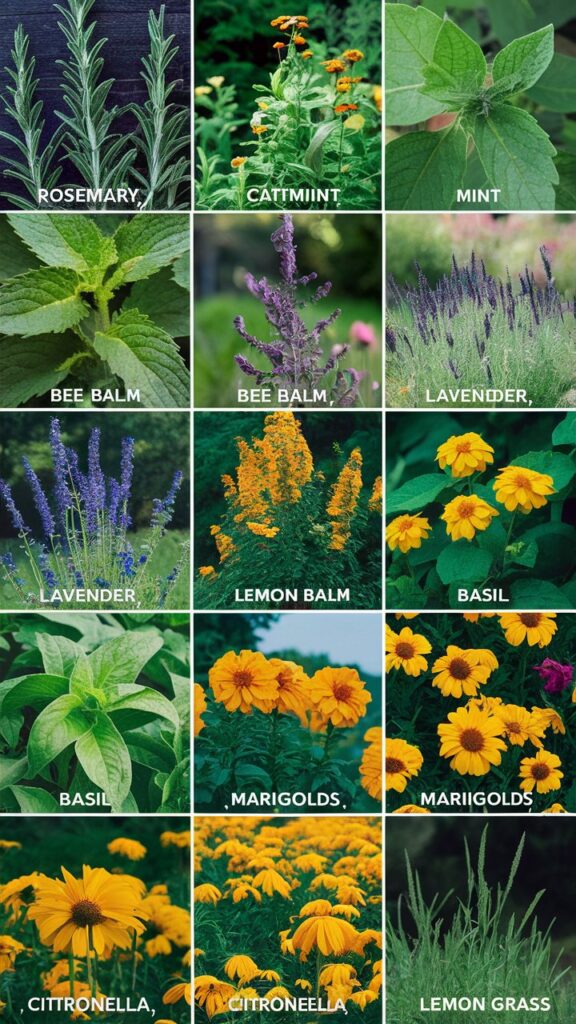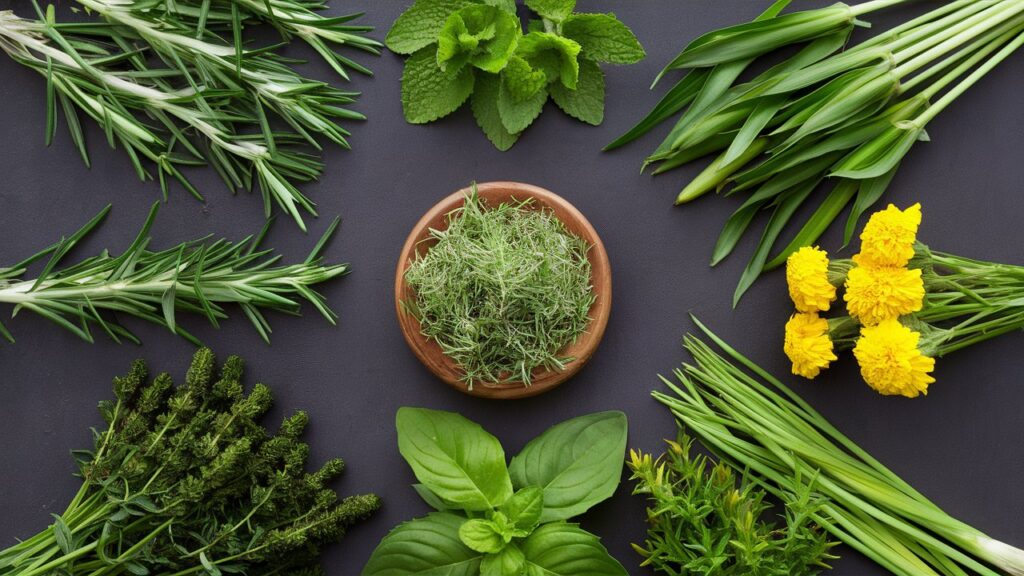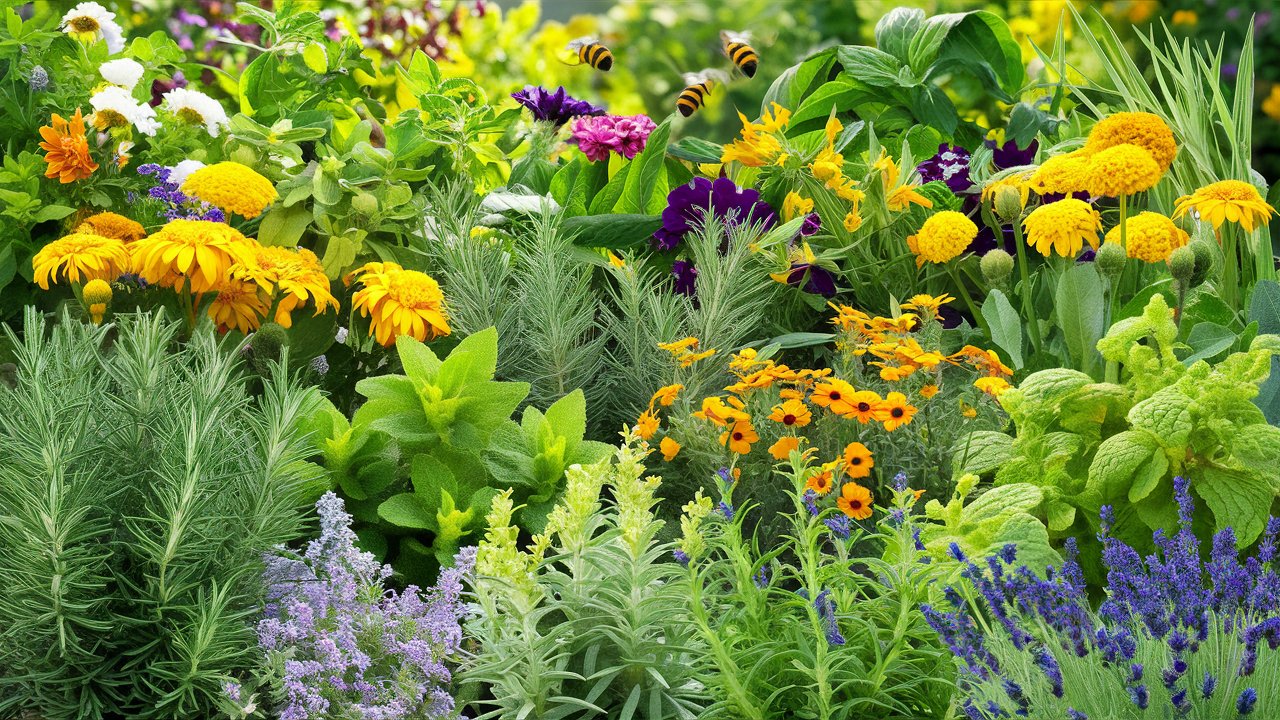16 Plants That Repel Pests
As the temperature warms, bugs become more active. You are familiar with the bugs I am referring about. Mosquitos, gnats, and flies. BUT! Did you know there are natural methods to repel these pests? All you have to do is pick which plants repel!
You might use mosquito/bug sprays, candles, torches, or a combination of the three. Or you could take the natural route and plant these wonderful plants near your outdoor seating spaces to help prevent these annoying pests and creatures.
Most plants that keep bugs away do so because they have natural scents that keep mosquitoes away and fill your garden with lovely smells. You can grow some of these plants to naturally keep mosquitoes away if you don’t want to drown yourself or your yard in bug spray. Put these plants in places where people will be going a lot, like by a hallway or a place to sit.

1. Lavender
Have you ever thought about how bugs, rabbits, and other animals have never killed your lavender plant? It’s because they smell so good. The lovely scent comes from the essential oils on the plant’s leaves. Some people even say that lavender oil makes mosquitoes less able to smell! Once it is established, this plant is very tough and won’t die from dryness. It only needs full sun and good drainage. It can live in a lot of different temperatures, but it does best in hot places.

2. Marigold
Have you ever observed that your lavender plant has never been ravaged by pests, including not just insects but also rabbits and various such animals? It is because of its wonderful smell, which originates from their essential oils that are located on the leaves of the plant.
Some people even believe that lavender oil might make it more difficult for mosquitoes to detect odors.
This plant is highly hardy and drought-resistant once established, and simply requires full light and adequate drainage. And although it can tolerate various climes, it flourishes in warmer locations

3. Citronella Grass (Lemon Grass)
Citronella grass, often called lemon grass, is a well-known natural insect repellent due to its distinct aroma. In fact, plants with a lemon aroma, like citronella grass, are advised by the Brooklyn Botanic Garden to deter mosquitoes.
The good news is that the live plant has the highest pest-repelling effectiveness. Because it cannot withstand the winter, this low-maintenance plant grows best in large pots; however, in warmer climates, it may be planted directly in a sunny spot in the ground.

4. Catmint
Catnip, a common mint, may be a weed but it repels insects 10x better than DEET (common insect repellent) according to Iowa State University research.

5. Rosemary
Rosemary is a fantastic mosquito repellant suggested by the New York Botanical Garden and PlantShed. The woody aroma of rosemary repels mosquitoes, cabbage moths and carrot flies. It thrives in hot and dry areas and may be cultivated in pots. Rosemary may also be trimmed into different shapes and sizes, making it a charming addition to your yard.

6. Basil
Basil is another plant that may serve function as an insect repellant. The strong fragrance the basil leaves give off are what keep pests at away.
And because all varieties of basil help to keep flies and mosquitoes at bay, feel free to experiment and locate the proper sorts of basil to incorporate into your garden.
This herb prefers to be kept wet, requires excellent drainage, and appreciates plenty of sun. You may grow basil in pots or in the garden, alone or with other flowers, as long as both plants satisfy the same criteria

7. Citronella / Scented Geranium
Scented geraniums, especially the lemon-scented type, are popular mosquito-repelling plants suggested by PlantShed, BBG, and NYBG. Their powerful aroma, similar to citronella grass, keeps various sorts of pests away. These fast-growing plants thrive in warm, sunny, and dry regions. For colder climates, they may be cultivated in pots with frequent trimming.

8. Bee Balm
Sure, bee balm (Monarda) is a superb plant to attract useful species like bees and butterflies. Its fragrant oils generated by crushing the leaves deter harmful insects. Plus, you’ll get to enjoy brilliant blossoms, in tones of red, pink, lavender, white, or purple, all summer long.

9. Mint
Mint is an excellent alternative for keeping undesirable insects at away around your house. The stronger the mint’s aroma, the more efficient it is in repelling mosquitoes, flies, and even ants. You may grow mint in pots on your patio for easy access to both fresh leaves for your tea and a natural pest control strategy for your home’s exterior. Dried mint leaves may also be used inside to prevent pests.

10. Floss Flower (Ageratum)
This lovely annual flower produces superb bedding or container plants. Floss flower contains coumarin, a substance that helps repel mosquitoes—but also renders it hazardous if consumed by dogs or people.

11. Sage
Sage is an excellent insect repellent if you like gathering around a fire pit in your garden. Toss some of the plant into the flames, and the earthy odor will deter pests. Sage may also be dried and used to produce homemade insect repellent.

12. Allium
These bulbs, which include garlic and onions, emit a pungent odor that mosquitos dislike. You’ll like the fanciful globe-shaped blooms of allium, which seem to float atop long, thin stalks.

Step-by-Step Guide for Making a Bug-Free Garden with Mosquito-Repelling Plants
Select Your Mosquito-Repelling Plants
Choose plants with bug-repelling characteristics, such as lavender, citronella grass, marigold, peppermint, and rosemary.
Select a Sunny Location:
Most mosquito-repelling plants thrive in bright sunshine, so choose a location in your yard that gets enough of it.
Prepare the Soil:
Make sure your soil is well-drained to avoid waterlogging, which might attract mosquitos. Use a nutrient-dense soil mix appropriate for your plants.
Plant Your Bug-Repellant Plants:
Dig holes based on the size of the plant’s root ball, insert the plants in them, and carefully backfill with earth. To allow for development, space the plants suitably for their mature size.
Water and Mulch:
Give the freshly planted mosquito-repelling plants plenty of water to help them grow roots. Apply an organic mulch layer around the plants to keep moisture in and weeds out.
Prune and maintain your bug-repellent plants on a regular basis to promote healthy development and improve their repellent powers. Remove dead or damaged foliage to stimulate new growth.
Companion Planting:
Consider using companion planting tactics to increase the efficiency of mosquito-repelling plants. Companion plants such as basil, lemon balm, and catnip may help repel bugs while also attracting beneficial insects.
Monitor and care:
Monitor your bug-repelling plants for symptoms of pests or illnesses. Address any faults as soon as possible to keep the plant healthy and the mosquito repellent effective.
Enjoy Your Bug-Free Garden:
With the right care and upkeep, your mosquito-repelling plants will grow, providing a bug-free refuge in your garden. Sit back, relax, and enjoy your outside area free of mosquitoes and other insects.
Share your success.
Share your bug-free gardening experience with friends and family. Encourage people to investigate the advantages of mosquito-repelling plants and build bug-free outdoor places for everyone to enjoy.


